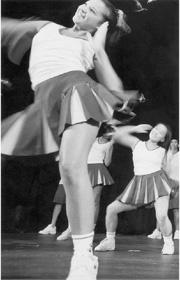BEAUTIFUL FILMS are no-brainers. Point the camera at a lush landscape, and voilଠyou’ve got beauty. Sofia Coppola’s The Virgin Suicides is remarkable in that it transforms the most mundane environment—suburbia—into something interesting and, yes, beautiful, without the slightest hint of irony. In this way, her debut feature is like Eric Mendelsohn’s underappreciated Judy Berlin (1999), a scrappy little indie film that makes today’s Long Island seem like Walt Whitman’s stomping grounds, the air thick with mist and train whistles. Yet Virgin, set in 1975 Michigan, is far more sumptuous and painterly, as if Coppola were trying to create a friggin’ Renoir set in middle America. Of course it helps that she has a big budget and her famous father as the picture’s coproducer. Still, Virgin signals a turning point in the 28-year-old Coppola’s career.
THE VIRGIN SUICIDES
directed by Sofia Coppola
with Kirsten Dunst, Kathleen Turner, and James Woods
opens May 5 at Broadway Market
Until now, the daughter of Francis Ford Coppola and wife of Spike Jonze (Being John Malkovich) didn’t seem to have much of a future in film. Her previous acting efforts—most infamously The Godfather: Part III—were scathingly panned by critics as a rich girl’s dabbling. Visiting Seattle recently to promote Virgin, Coppola said that while she felt fortunate to learn about filmmaking from her father, she hoped that “people will see the movie on its own terms and not because of the men in my life.”
In Virgin, Coppola envisions suburbia as a sensual experience, with cicadas buzzing, sprinklers clicking, and sunlight streaming through leafy trees. The five Lisbon sisters, aged 13 to 17, live in a pastel world of quilted bedspreads, unicorn cologne bottles, and journals filled with bubblelike handwriting. Adapted from Jeffrey Eugenides’ 1993 novel, the film amplifies the girls’ budding sexuality: See the 13-year-old Cecilia (Hanna Hall) in a gauzy white dress, snaked around a tree branch. Or the sirenlike Lux (Kirsten Dunst), with bared shoulders and eyes peering beneath long blonde hair. As the most seductive of the bunch, Dunst is wonderful, bringing to her character the maturity of a veteran actress.
THEIR REPRESSED parents contrast the girls’ beauty. Mr. Lisbon (James Woods) is a math teacher at the girls’ parochial school, dorky as a pair of argyle socks. As the dowdy Mrs. Lisbon, Kathleen Turner—wearing matronly padding—looks like she never stays up past nine o’clock. Yet while the parents impose increasingly protective rules against dating, we don’t get a sense that their daughters are suffocating beneath their control. Curfews are no match for teenage sexuality, and the girls will get out sooner or later. Lux in particular has a lust for life that makes her kiss a boy violently and fight against her mom to keep her Aerosmith records.
That’s why the suicides are such an odd, passive choice, even as metaphor for self-denial. You could argue that chastity is like death, but the girls’ vibrancy renders their final decision puzzling.
For all its visual potency, the film doesn’t get over the narrative hurdles posed by the book. On the surface, Virgin seems like a girls’ coming-of-age story, but because it’s narrated by the neighborhood boys who watch them from afar, the Lisbon girls end up as mythical figures, their personalities unknowable. The story is handsomely photographed but remains muddled.
Even in their conclusion, the boys’ speculation about the girls’ suicides seems less like revelation than nostalgic prattle: “We felt the imprisonment of being a girl, that they were really women in disguise. We knew that they knew everything about us and that we couldn’t fathom them at all.”
Despite its shortcomings, however, Virgin Suicides offers rich satisfactions; Coppola knows how to use the camera and understands how to direct actors. The result is a beautifully nuanced yet ultimately opaque film that—like the girls themselves—lingers long in memory.







